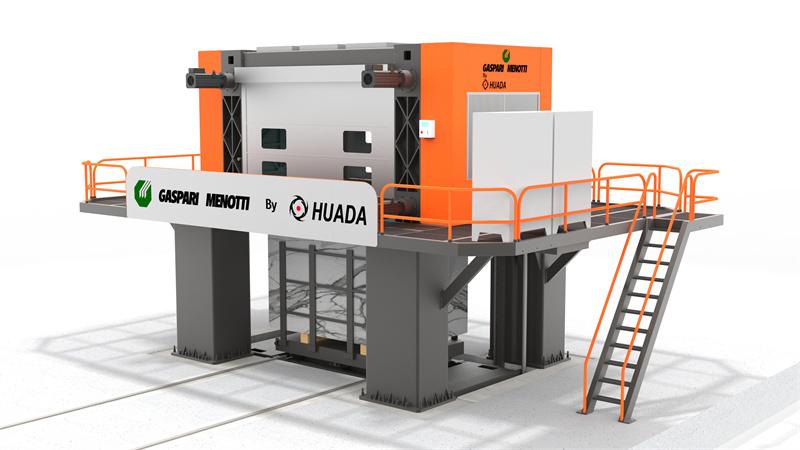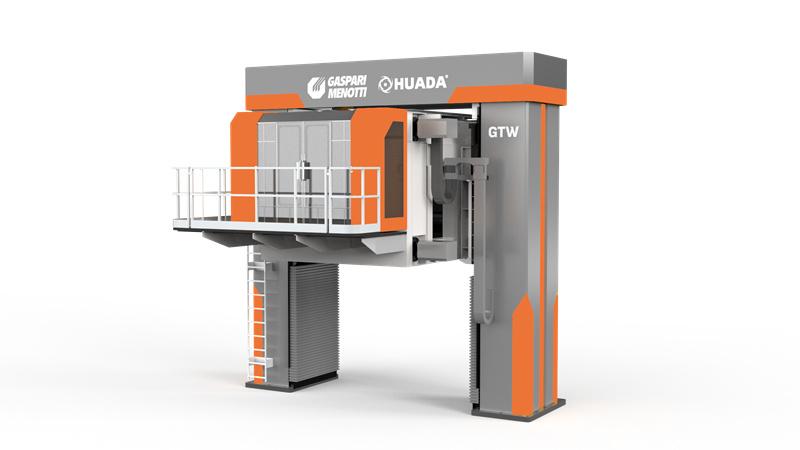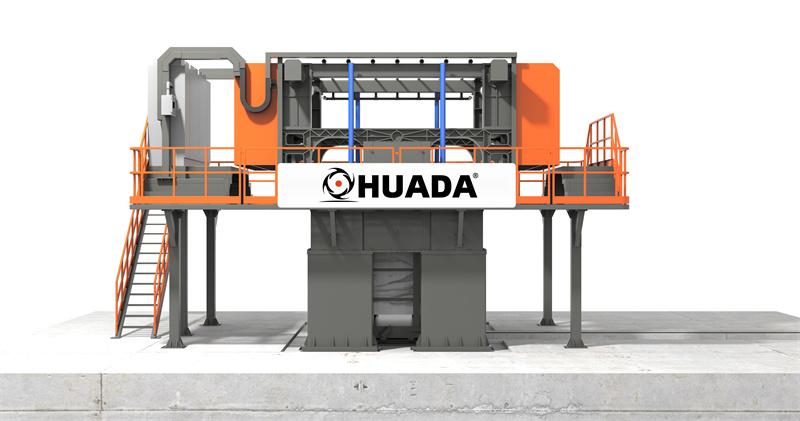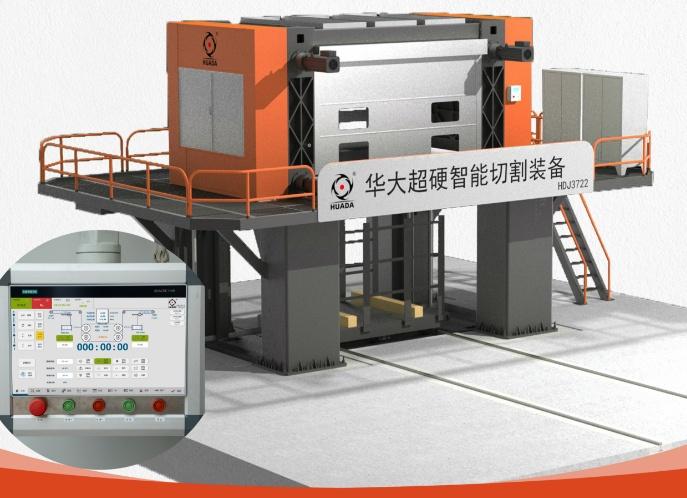Author:Huada Quarrying Machine FROM:Stone quarry machine manufacturer TIME:2022-03-17
HUADA Stone Mining Research Institute Dr. Wu
As domestic economy grows steadily and continuously, and a new development pattern where domestic circulation at its core, with dual circulations of domestic and international market interconnect and promote each other, domestic stone industry has confronted revolution driven by technology innovation and cross field merge under the policy of “renew industries and get them involved in the dual circles”. Since the stone industry has been gradually integrating mines and promoting environmental protection,many large state-owned companies begin to get their own market shares, and many stone companies with a relatively high revenue are finding their paths toward international stone market. This trend has set a higher standard for the innovation and management in domestic stone industry, which leads to an urgent need for qualified labor.
In order to help domestic stone industry to develop in a sustainable way, this passage provides suggestions and countermeasures on the human resource problems in stone industry through the analysis of the current situation and issues in stone industry by comparing stone industry with other industries with relatively mature human resource management practices.
China produces and consumes an overwhelming quantity of stones in the world, with more than 2,000 stone companies and a market share of 500 billion CNY. This market boasts a super-fast development in past few years, and now there is severe competition with an increasingly low margin, so the most lucrative age has faded away. Stone industry is the pillar of local economy in China’s stone industry clusters, and they provide a lot of jobs while benefiting the local finance. The advancement of industry and technologies is shaping stone industry with automatic, intelligent and digital mining methods and equipment, which stimulates the revolution in processing procedures and management mechanism. Nowadays, there are nearly 10 million workers in domestic stone industry, where only 1.5% workers have a degree above junior college and an intermediate technical title. Therefore, it’s a must for companies to timely cultivate and hire talents that meet the need of the new age.
i. The unbalanced distribution and severe shortage of talents.
Driven by the strong domestic demand, China’s stone industry has developed rapidly during the 40 years after the reform and opening up. And the gradual emergence of stone industry clusters (such as Fujian, Guangdong, Shandong, Hubei, Xinjiang and Sichuan) causes a greater and greater demand for workers in stone industry. As for the distribution of talents, prosperous coastal areas have much attraction to talents. Old workers have gradually retired at this time, so there is a lack of basic workers in plants. When it comes to ability, there are few trailblazers with high skill level in this industry with a lack of innovation talents. Also from an overall view, there are few young people among the workers in this industry.
The HR problem described above is the fundamental problem in stone industry. If unsolved, the overall innovation capacity will remain insufficient, and the business environment will stay in “a small scale, a low level, a loose and disorder situation”. Many companies have immature HR management methods and blindly follow the pioneers in this industry to set a high requirement in recruitment without clear purpose and HR arrangement. Their actions, to a great extent, waste a lot of professional workers, making those workers stay in low rank with little outcome. This waste results in a severe shortage of professional talents, and in turn it agitates the shortage because many talents can only find a job in a lower rank.
ii. The shortage of elites and trailblazers in stone industry.
Qualified labor is the most important factor for a company to compete with other companies. As for now, it’s a universal circumstance that a company finds it difficult to hire an elite or a technical worker, and it may even be harder to keep potential talents. The author found this situation may be harder for stone industry after communicating with many companies in this matter, and lack of talents has already weakened the momentum of this industry.
Data from official channels show that, high level labor often gather in areas like schools, medical fields, e-commerce, Internet of things, chemical fields and engineering, and few workers in stone industry become high level talents or technical masters. Lack of elites and trailblazers greatly destroys the environment for stone industry workers to grow and for companies to improve their productivity.
iv. Pay much focus on marketing and branding but overlook inner management.
1. Hard to hire a qualified labor and keep them. 1.
Due to few candidates, many stone companies recruit from workers’ kinship and townsmen. Though recruiting websites are available in this industry, but few people will submit their job applications, making shortage of workers still a problem. Many stone companies hold the idea of “experienced workers are better”, so they are willing to hire experienced workers from other stone companies, making salaries go higher and higher, which increases the cost in stone industry. Given to the low stereotype for people to set a company in stone industry, many experienced salesmen and managers choose to start their own careers. This phenomenon is the main reason for many companies unwilling to cultivate talents with many efforts. Some workers change their jobs frequently because of hard work, bad working environment or other factors.
2. Lack of vocational training and labor cultivation platform. 2.
Not only high-level trailblazers, higher engineer and managers are needed in this industry, but technical talents are also in urgent need. China’s vocational training, with a long history of nearly 70 years, has played an important role in cultivating technical talents, solving worker shortage and propelling domestic economy. Recently, some associations and companies have taken part in vocational training and talent cultivation program, such as Nantong Stone Association, Fuyue Stone company, HUADA Superbrasive Equipment company, and their outcomes are Stone Industrial school of Nantong Vocational College, Stone Class in Sanyi Vocational College and HUADA Stone Mining Research Institute, etc. However, those institutes can only teach less than 200 people per year, leaving a huge gap between the talents cultivated and the demand of talents in this industry.
In order to solve worker shortage and improve their skills, the stone industry should not only pay attention to local governments’ efforts of promoting vocational training, but also focuses on in-service education. The Occupational Dictionary of People’s Republic of China (Edition 2015) has collected “stone producer”, including “stone miner”, “stone processor”, “stone carving worker” and “stone care worker”, but most workers in stone industry have never been trained.
3. Ignore inner management system and incentive mechanism in companies. 3.
Facing the gradually severe competence in the market and huge challenge brought by epidemic at home and abroad, stone industry is forced to embark upon a path toward refined and intensive development. Efficiency, quality and cost are unavoidable questions when talking about company’s inner management. Entrepreneurs should achieve a balance among those three factors. If they want to improve quality, then efficiency and cost will definitely be affected, so most companies simply choose “contract system” or “piece-rate salary system” to achieve a win-win situation between workers and companies. “Piece-rate salary system” has its own advantage by relating workers’ salaries to their works, and it gives a higher salary to those hardworking workers, which can not only increase productivity, but also promote fairness. However, can stone industry find the balance between quality and efficiency by changing the incentive system in this competence environment with high homogeneity
Ⅴ. The low status of stone industry has no attraction for qualified labor.(四)
Current situation shows that most people know little about the stone industry, and topics about the difficult conditions and pollution of stones are frequently mentioned. Though stones have unique and artistic characteristics, they still belong to a relatively traditional classification, so many young people don’t want to choose stones as building materials or decoration. Except universally mature stone mining and processing methods, the working environment in stone industry is still very hard, and many parents don’t want their children to join the stone industry.
Young people are likely to choose other industries when finding a job, which indicates the fact that the stone industry is not well recognized among people, making it a very difficult for stone industry to attract talents.
v. Occasional safety and labor problems
For now, surface-mining method is widely applied to most domestic mines. However, insufficient safety education, regulations and measures often result in mining accidents, which brings extremely bad effects to local stone industry. Nowadays, many companies in stone industry choose outsourcing as their producing method. Many companies with a relatively big scale have legal and complete employment procedures, but most small companies have no employment procedure and even no social insurance. Potential risks are mounting when considering job risks, insufficient safety measures and no labor insuranceSolutions to HR problems in domestic stone industry.
Nowadays, many companies in stone industry choose outsourcing as their producing method. Many companies with a relatively big scale have legal and complete employment procedures, but most small companies have no employment procedure and even no social insurance. Potential risks are mounting when considering job risks, insufficient safety measures and no labor insurance.
II. Solutions to HR problems in domestic stone industry.
Every industry will go through four stages in its life cycle: market-entry, expansion, mature and recession. Many factors can be helpful to tell the stage that one industry may lie in, that is, the growth rate of the market, the growth rate of the demand, types of products, competitors, entry and exit barrier, technical revolution, purchasing behaviors of customers, etc. The current growth rate of stone industry remains at a normal level after decreasing from a high level several years ago. That implies a stable revenue and margin increase rate, even if there is a downward trend. Except for several large companies in stone industry, most stone companies have a small size with low innovation capacity, which suggests that the stone industry has entered the mature stage, where has less demand, fierce competition and low margin. The management and talent pool of stone industry, comparing with other industries, still lags behind in expansion stage on some aspects such as operation mode, resources allocation and scale. The cultivation of labor in the expansion stage of an industry determines the depth, scale and speed of the development of the whole industry, and the cultivation needs not only efforts from companies, but also attention and participation from government, associations, vocational colleges, training institutes and the industry.
The life cycle of the industry
i. Improving stone workers’ professional skills through intensified vocational education and training.
Vocational education has gained universal attention among all fields for China’s education system revolution and policy of “combing industry and education”. On May 18, 2019, the State Council published Professional Skills Enhancement Project (2019-2023). On September 16, 2020, Ministry of Education and other eight departments issued Vocational Education Improvement Project (2020-2023), where demonstrates the equal position of academic education and vocational education, and it also suggests to cultivate high level talents for sustainable development of the economy and the competence capacity of the whole country. Therefore, equal attention should be paid to academic education and vocational education, providing education and training courses to students and other social members. On August 30, 2021, the State Council introduced Employment Improvement Project during “the Fourteenth Five-year Plan”, which urges to further implement the employment priority strategy, intensify vocational training and increase jobs to improve employment quality and mitigate the structural employment problem. Meanwhile, much attention should be paid to the cultivation of technical and skillful workers, job-based cultivation should be intensified, and provide vocational training at every level in a large scale. By doing so, workers’ skills will be improved, people’s welfare will be enhanced, and the shared prosperity will be closer to the people.
Those policies have been implemented for many years, and now there are 10.066million students in vocational colleges, and the number of students has kept increasing in recent years. Domestic vocational colleges are transforming their cultivation mode and management mode to serve the local economy and meet the industry’s needs. However, the stone industry is restricted by its late start, small scale and insufficient workers, so it is a challenging work to design related teaching instruction and materials and cultivate qualified teachers. Given this situation, stone industry should be active in this project to find a path to cultivate talents with characteristics of this industry.
The combination of companies and education requires the help from companies, colleges and even the government, so policy is an important factor to implement this project smoothly. In order to cultivate specific skillful talents for stone industry, the government should encourage local vocational colleges set relative courses, making stone mining, processing, carving and caring real courses at educational level. To intensify the job recognition among workers in stone industry by showing them government’s attention on this industry. Meanwhile, the cooperation between colleges and companies should be intensified, so as to let technical talents with enough knowledge in this field take more practices in real works, thus they can also provide new ideas for the innovation in stone industry. This cooperation will provide the whole industry with young and skillful people, which will improve the talent pool of the industry.
In March of 2020, Occupational Skill Authority of Ministry of Human Resources and Social Security asked the Stone Carving and Inscription Institute of China Planning Academy of Building Materials Industry to make Occupational Standard for Stone Production Workers. Then many experts in stone industry in many institutes like HUADA Stone Mining Research Institute actively take part in this project, hoping to lead “the combination of industry and education” by making standards about occupational skills and exploring in-service education in stone industry.
2.Draw on the “dual vocational education system”, companies should get involved in.
After the World War Two, Germany has taken “dual vocational education system” as the key point to promote the development of German industry. In this system, students have dual identification: workers in companies and students in vocational schools, and it also means that companies and colleges will work together to teach them. HUADA Stone Mining Research Institute has made a survey among many stone companies and vocational colleges. The survey shows what companies complain most is “colleges teach students with outdated and useless knowledge”, and what colleges complain most is “companies have no passion and no willing to join in this project”.
To make vocational colleges a perfect place to cultivate talents, every party involved should actively take part and invest their own efforts. For another, graduates from colleges can enter companies for practice, and elites in industry can go to colleges to teach students. Companies can also set a “secondary class” in companies to cultivate integrated and qualified talents with enough experiences.
ii. Establish a comprehensive talent cultivation system and hire talents from more channels.
Front line workers are important human resources for this industry, but their “high job mobility” and “scarcity” make companies hard to keep them. The human resource cost is increasing because of the loss of proficient technical workers, frequent job changing of new workers and increasing salaries required by proficient stone workers. Many small companies have no HR department, no personnel mechanism and no cultivation system, so many of their front-line workers come from outsourcing parties, which has a high uncertainty. Therefore, complete countermeasures are required.
1. Companies should set a long-term inner talent cultivation system to cultivate talents for companies and quench talent loss. And this system can be built through complete arrangement since hiring workers from labor market and colleges. Companies should establish post training system and dispatch new workers to different jobs on processing procedures for training, which can teach them all about the processing skills, in case of accidental job vacancies. Random dispatches will help workers to master new skills and eventually become proficient workers suitable for all kinds of procedures. Apart from inner training, companies can provide workers with outside training opportunities, showing concerns to workers.
2.Qualified companies can provide internship chances for students in vocational colleges, and colleges can choose some talents to companies at a fixed interval, and select suitable talents for technical and management training. Government should encourage companies collaborate with companies, set professional allowances and scholarship for related majors, increase jobs and promote colleges to set related majors, in order to attract more talents to study in related majors, and help stone companies walk on the path towards a knowledge intensive, skillful and innovative mode.
iii. Intensify the sense of belonging of stone workers about their companies, establish a long-term motivation system and vocational development project.
Those “post-80s”, “post-90s”, or even “post-00s” are the majority of today’s human resources. Comparing with their former generation, they have a stronger sense of ego, and a stronger desire for recognition, so they can be trained into real technical workers easily. They hope companies can provide them with a win-win collaboration mechanism.
1.The most common salary distribution systems are time rate system and piece-rate salary system, etc. The time rate system can keep those new workers who are not familiar with their works at their positions, and piece-rate salary system can be attractive for those determined workers to master new skills quickly. Companies can choose both systems to stimulate workers to actively learn and improve their skills, and it can be more effective if give workers with better skills subsidies. It is also a good choice to adopt modern stimulation measures such as “partnership system”, “amoeba” and “stock incentive mode”, cultivating members’ awareness of the position of masters of laborers.
2.As a building material, stone frequently appears in working fields and processing workplace. And stone industry workers have a relatively bad working environment, so companies should clean and sort workplaces timely, provide workers with security training and protection equipment. Meanwhile, health management system and warning signs are necessary for stone companies, so regular physical examination are required to prevent workers getting occupational diseases. Thus, companies can protect workers from many aspects and provide workers with a safe, clean and health workplace.
iv. Strictly obey related laws, and protect rights of workers in stone industry in a better manner.
Stone products heavily rely on mines, but opinions about closing stone mines are rising with a stricter environmental protection law. Because of raw materials’ shortage, many stone companies have to close. It’s a transformation stage that stone industry takes a path toward sustainable and green development, which is a big challenge for workers in this industry, for this deed will determine their future. Under this situation, the status of stone industry should be improved to attract talents. And the workers’ rights should be protected firstly.
2.Standardize professional qualifications authentication and training, and increase subsidies for skill training applied to employees in stone industry. Companies should improve the awareness of self-protection by encouraging employees to improve their professional skills and skills for operating equipment, get a better understanding about this industry, know more about occupational diseases and master safety production skills.
v. Quicken digital development of stone companies, and promote the transformation toward a Internet-based industry.
In recent years, government and the industry have been leading the way to embark upon a digital and intelligent path, and this has already made progress. Related matching companies should gradually increase investment to input advanced equipment to replace a part of labors for a lower cost and better quality. At the same time, workers in stone industry should continuously promote their skills, and accept training about new equipment to master the knowledge and make equipment work at their best situation.
The core for competence remains “human resource” during the industry’s transformation from sustainable development to high-quality development. This point must be clear for every manager and entrepreneur in this industry: “talents are the future of a company.” The health and prosperous development of stone industry can be promoted in following ways: intensify the inner management of the industry, actively protect and restore the ecology and get rid of human resource shortage by establishing people-oriented view and applying people in a scientific way.




